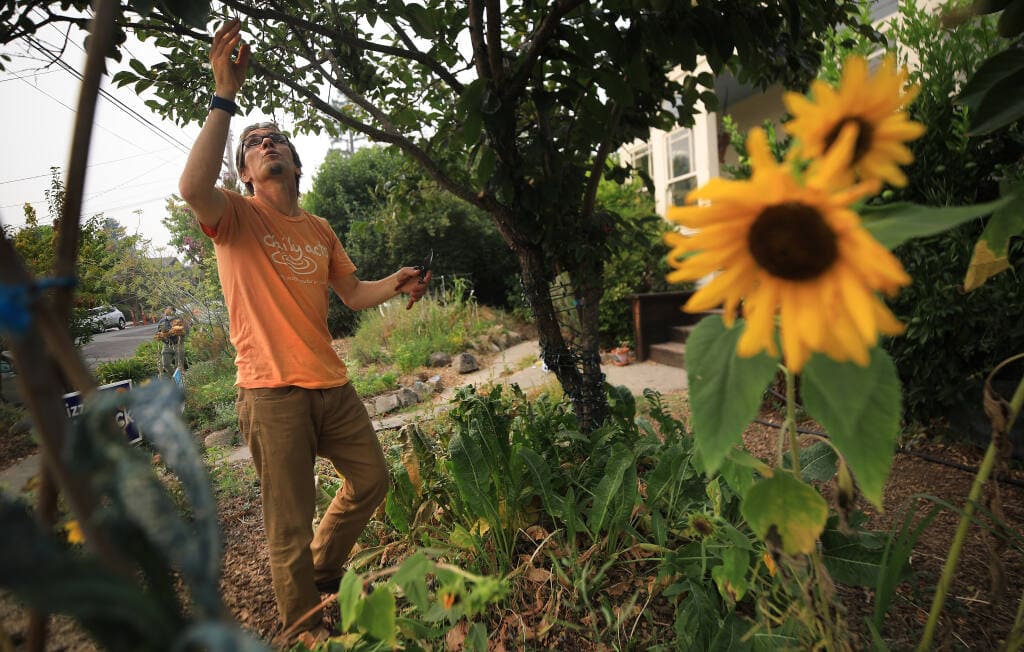It all starts with what breaks your heart.
But it doesn’t end with losing heart.
For Trathen Heckman, the founder and executive director of Petaluma-based sustainable living nonprofit Daily Acts, finding an answer to what breaks your heart just might feed your soul.
Two decades after feeling his heart break over an ever-increasing climate crisis, Heckman acknowledged the hurt, then got to work.
And in the process, he and the Daily Acts staff, now numbering 14, are bringing thousands of people with them.
The hurt that inspired Heckman to launch Daily Acts more than 20 years ago is also what inspired him to write “Take Heart, Take Action: The Transformative Power of Small Acts.”
The book was recently published in e-book form, but a crowdfunding effort has allowed Daily Acts to order 1,000 hard copies printed in what Heckman describes as an “eco-friendly” way to both sell and donate to individuals, nonprofit activist groups and educators.
Funds raised by the sales will be plowed back into Daily Acts programs.
Recycling, in a way.
Twenty years ago, Daily Acts began with hands-on tours of gardens and homes where sustainable practices were already in place. The idea was for people to see change in action and help them visualize making it happen in any scale on their property.
The group started offering classes — on greywater irrigation, on permaculture yards, on composting and rainwater harvesting.
The group advocates and educates.
Members post simple “how-to” videos. They keep things simple, doable and, hopefully, inexpensive.
That is the “Take Action” part.
They are small, individual steps, no doubt. But it’s the way forward, Heckman insists.
“It’s easy to get overwhelmed … by the scale of the climate crisis, the scale of systemic racism, the scale of the wildfires,” he said. “Ultimately you have to focus on your circle of influence and when you focus on your circle of influence, it grows.”
When Heckman felt his heart break over the climate crisis, over social injustice, over the lack of green space, he also felt he needed to act.
“At the personal level, it’s starting with what sets you on fire, what inspires you?” he said. “It’s creating new habits and practices in your daily life so you can stay awake and engaged in this work.”
He says it’s easier to stay inspired via positive energy than negative.
“How does it feel? To take that cynical approach as opposed to ‘Wow, I’m going to do what I can,’” he said. “That is how bigger transformation happens, through lots of really acts of smaller transformation.”
So he crafted the book, which outlines philosophies, action points and ways to stay motivated and engaged even in the face of daunting realities.
Daily actions can help gird people against feelings of being overwhelmed, he said.
“When you are doing those things, you start to build resilience and to weather difficulties and heartbreak and stay centered when things throw you sideways,” he said.
That’s the “Take Heart” part.
“Individual action will not change the world, but it’s the only thing we have,” he said. “You could recycle a bottle mindlessly or you can be ‘I’m living my values.’ That acknowledgment and affirmation provides value, ‘Oh that feels good.’ It’s not an individual act.”
“It’s a way to start to build power in those small efforts,” he said.
And small power leads to collaboration with like-minded folks and that leads to greater power, he said.
Connection and community are a huge piece of Heckman’s work. It’s both a way to get more things done, make more headway, but also to fortify folks in the face of daunting challenges.
Heckman said his new book is meant to be a tool, a workbook to be underlined, circled and shared.
But it’s not a road map.
Because everyone’s road is different, and the ways people got to this moment in time are varied.
But a key component, Heckman said, is that once people decide to lean into the problem, they can acknowledge their paths to this point have been different, but still agree to come together.
Heckman sprinkles quotes throughout his speech.
From cultural anthropologist and author Margaret Mead: “Never doubt that a small group of thoughtful, committed citizens can change the world; indeed, it’s the only thing that ever has.”
And from Mahatma Gandhi: “Be the change you want to see in the world.”
He urges action and enthusiasm, not finger-wagging and scolding.
After all, we are all in this together.



